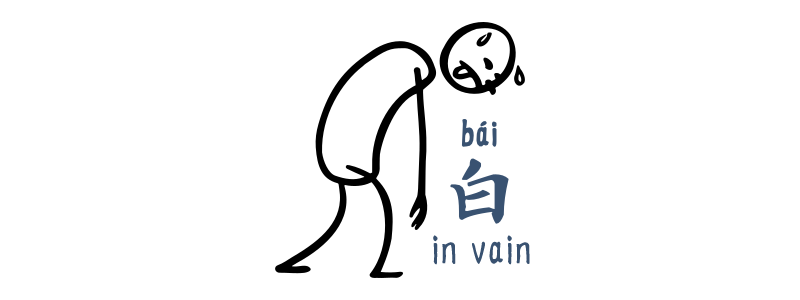Grammar Point:
The adverb 白 bái doesn’t mean white, but rather it signifies an action “with no effect” or “in vain,” similar to the concept of white having no color. It is typically used to modify an action verb and indicates the meaning of doing an action that ultimately yields no result.
Structure
白 + Verb + 了
白 is often used with one-syllable words such as 做 zuò for “to do,” 说 shuō for “to speak,” 买 mǎi for “to buy,” and so on.
我不知道這家店禮拜一休息,白去了我不知道这家店礼拜一休息,白去了
I did not know that this store is closed on Mondays, so I went there for nothing.
老師說明天的考試取消,我昨晚的書都白讀了老师说明天的考试取消,我昨晚的书都白读了
The teacher said tomorrow’s exam is canceled. All I studied last night are for nothing.
你如果不回來吃應該先跟我說,現在我這些菜都白做了你如果不回来吃应该先跟我说,现在我这些菜都白做了
If you’re not coming back for dinner, you should have told me first. Now I’m doing all these dishes in vain.
三十歲了還不知道怎麼洗頭,你真的是白活了三十岁了还不知道怎么洗头,你真的是白活了
You’re already 30 years old and still don’t know how to wash your hair. You’re truly living in vain.
說也是白說,還不如不說说也是白说,还不如不说
Speaking is just pointless; it’s better not to say anything. (Chinese idiom)
白 + SV + 了
聽說會議臨時取消了,那你這幾天的準備不都白忙了嗎?听说会议临时取消了,那你这几天的准备不都白忙了吗?
I heard that the meeting was canceled abruptly, so your preparations for the past few days were all in vain, right?
我收到公司的信以為要幫我加薪,所以我很高興,結果是要我加班,真是白高興了我收到公司的信以为要帮我加薪,所以我很高兴,结果是要我加班,真是白高兴了
I received a letter from the company. I thought they were going to give me a raise, so I was very happy.
It turned out that I was informed to work overtime, so I was really happy for nothing.
白 + 吃/喝/住
These three verbs 吃 chī for “to eat,” 喝 hē for “to drink,” and 住 zhù for “to live” have a special connotation. They often imply someone doing an action without paying for it or getting something for free.
他已經半年沒交房租了,房東說不能再繼續讓他白住下去他已经半年没交房租了,房东说不能再继续让他白住下去
He has not paid rent for six months, and the landlord said he could not continue to let him live for free.
他每次來派對都不帶酒也不帶食物,只想在這白吃白喝他每次来派对都不带酒也不带食物,只想在这白吃白喝
Whenever he comes to a party, he doesn’t bring wine or food. He just wants to eat and drink for free.
FYI
We already know that 白 bái means nothing in Chinese. Let me share with you a popular Chinese internet slang term. 小白 xiǎobái, which translates to “little white,” is commonly used to refer to someone who is inexperienced, naive, or lacks knowledge in a particular area or about a specific topic. It can also describe someone who is new to something and has a lot to learn. This term is often used playfully or lightheartedly. For example, if you want to say “I’m a total newbie,” you can say 我完全是小白 Wǒ wánquán shì xiǎobái.


